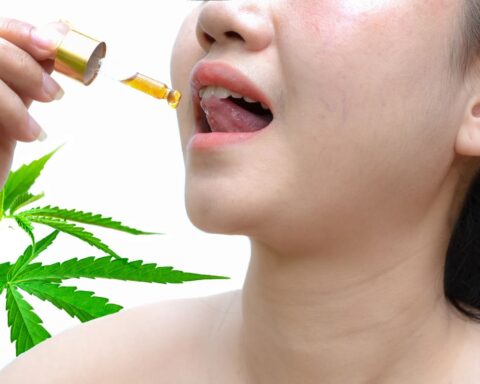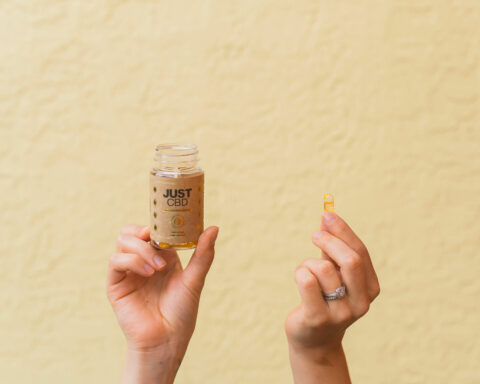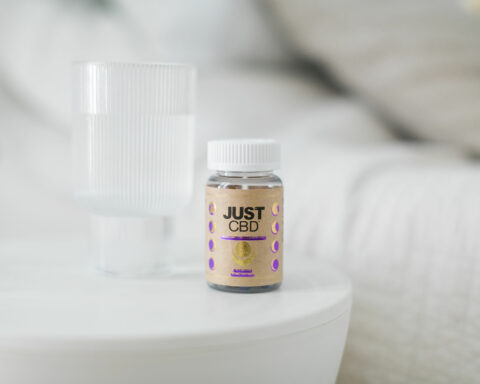The gummies, tinctures, sweets, tablets, oils, capsules, and topicals flood the market with numerous health claims, some substantiated, some false, and some for marketing purposes.
With ongoing study into the benefits of CBD products, one can use them for various purposes, including easing joint and muscle pain, calming sore or irritated skin, and generally improving skin wellness.
How CBD Works
CBD is an abbreviation for cannabidiol, a chemical compound found in the cannabis plant known as a cannabinoid. Cannabis, in addition to CBD, contains several other cannabinoids, including CBG, CBC, CBN, and of course, THC. CBD products like creams and balms deal with hemp-produced CBD, which is a type of cannabis plant. In comparison to marijuana, hemp contains almost minimal THC (less than 0.3 percent, legally allowed trace amount). Other cannabinoids (CBD, CBG, etc.) do not provide the same high as THC. Instead, they work both alone and collaboratively to deliver various therapeutic benefits.
The endocannabinoid system is how CBD and other cannabinoids interact with our bodies. This system is intricately linked to the peripheral nervous system, central nervous system, and other systems that control sleep, emotion, immunological response, digestion, and other functions. The endocannabinoid system’s receptors engage with the ingested cannabinoids and transfer benefits to the system.
CBD Topicals and the Skin
Our skin absorbs foreign substances, including dirt, sweat, bacteria, and fumes. Medicinal chemicals are absorbed via the skin and tissues and target “hot spots.” Some studies say the skin absorbs up to 60%–70% of what is applied to it. Because the skin is permeable, each chemical is absorbed differently.
The Uses of CBD Topicals
According to research, CBD topicals have various benefits to the human body, including anti-inflammatory properties, skin problems, and joint pain.
Peripheral Neuropathy
Peripheral neuropathy is a nerve injury that causes discomfort, numbness, and weakness in the feet and hands. According to a study due in 2020, CBD oil may considerably reduce pain in persons with peripheral neuropathy.
Arthritis
A 2016 study on arthritis discovered that some CBD products had long-term anti-inflammatory and anti-behavioral effects on arthritis.
Sore Jaw
According to a 2019 study, CBD products may help persons with temporomandibular dysfunction (TMD). TMD can result in jaw pain and stiffness.
Acne, Eczema, and psoriasis
According to the American Academy of Dermatology Association (AAD), CBD’s anti-inflammatory effects may help with acne, psoriasis, and eczema therapy.
How Users Preferred CBD Topicals
According to a market overview conducted by Cannabis Science and Technology, topical CBD is preferred, from lotions to creams and face masks. Lotions and creams outnumber all other topical formats by a wide margin, accounting for 43% of all formats. Balms come in second, accounting for 26% of all SKUs. These two categories account for 69 percent of the topical products examined. Oils (4%), roll-ons (6%), Sticks (7.5%), gels (3.6%), and patches (3%) were the other primary types, accounting for 24.1 percent of the total.
Side Effects of CBD Topical
It is impossible to discuss the uses of CBD topical without mentioning the possible side effects.
- Reapplying topicals as needed is generally safe. Pay close attention to the type of carrier oil used in your product, as coconut oil-based products may melt when exposed toheat. You should store these items in a cold, dark location.
- Many of them aren’t meant to be applied to injured skin.
- CBD is non-psychoactive, which means it won’t get you high. It is usually considered safe, with few negative effects; however, they occasionally occur.
- While CBD seldom enters the bloodstream through topical application, it may interfere with some drugs.
- According to other studies, CBD may interact with liver enzymes, preventing it from metabolizing other medications or breaking down pollutants.
- Before utilizing CBD products,always visit a healthcare practitioner for professional advice and dosage prescription.
- Though not so much research has been conducted to assess the impacts of using CBD topicals while pregnant or breastfeeding, it is safe to avoid
Conclusion
This broad selection of CBD topical treatments is great for cannabis newcomers who don’t want to smoke but want to get the advantages. Apply the ointment to the skin right away and wait a few minutes. Furthermore, CBD topicals are easy to administer and do not have the same strong effects as smoking marijuana. CBD topicals can help with pain and skin problems, including eczema and acne. When feasible, people seeking the most therapeutic benefit should choose full-spectrum, organic products.
References
Pamplona, F. A., Da Silva, L. R., &Coan, A. C. (2018). Potential clinical benefits of CBD-rich cannabis extracts over purified CBD in treatment-resistant epilepsy: observational data meta-analysis. Frontiers in neurology, 9, 759.
Baker, H. A. A. (2008). Estimated surface dose (skin absorbed dose) for the patient undergoing standard radiologic examinations. Journal of Kerbala University, 6(1), 260-267.
Chelliah, M. P., Zinn, Z., Khuu, P., & Teng, J. M. (2018). Self‐initiated use of topical cannabidiol oil for epidermolysis bullosa. Pediatric dermatology, 35(4), e224-e227.
Patsalos, P. N., Szaflarski, J. P., Gidal, B., VanLandingham, K., Critchley, D., & Morrison, G. (2020). Clinical implications of trials investigating drug‐drug interactions between cannabidiol and enzyme inducers or inhibitors or common antiseizure drugs. Epilepsia, 61(9), 1854-1868.
- Eye Spy: Worldwide Eye Color Percentages - April 19, 2024
- Elevate Energy, Soothe Stress, And Peak Performance with The New UNBEETABREW Coffee Sensation - September 21, 2023
- Chef Bob’s Coffee: A Journey Fueled by Passion - July 29, 2023









